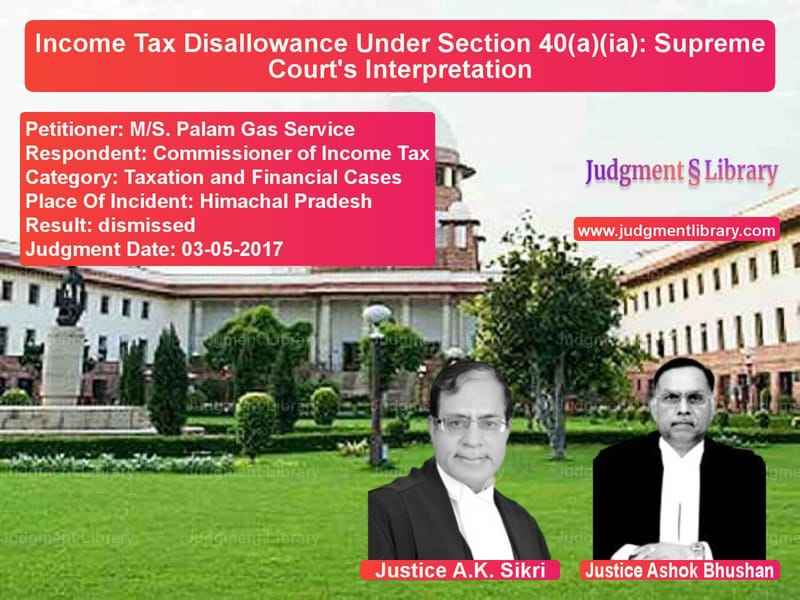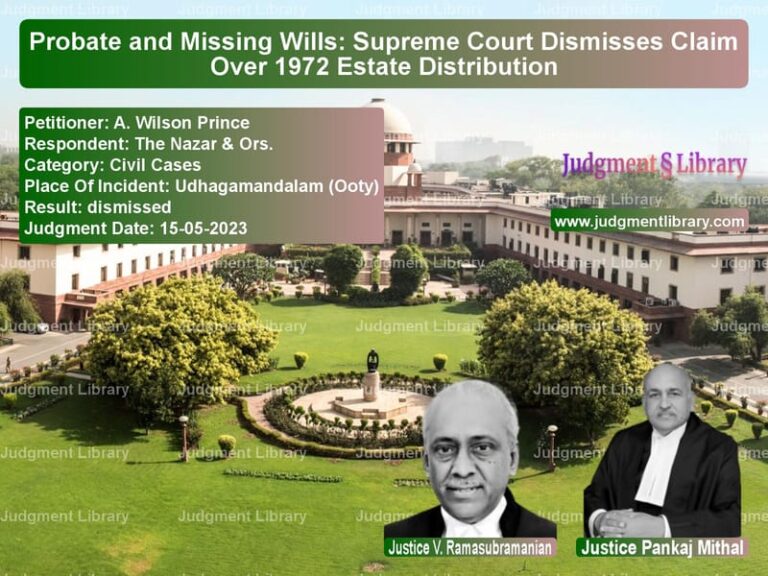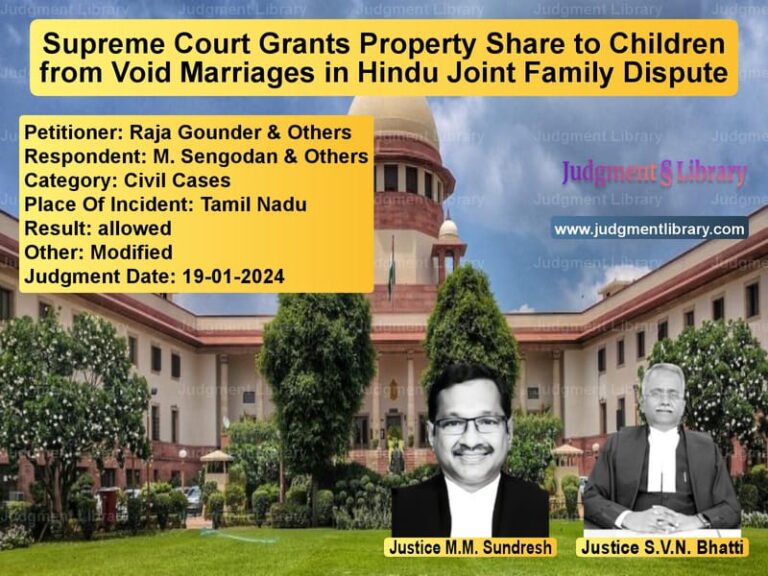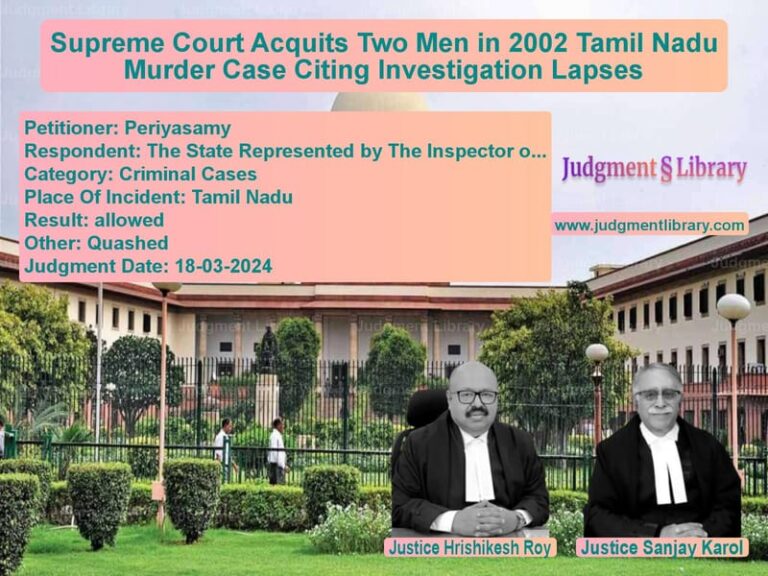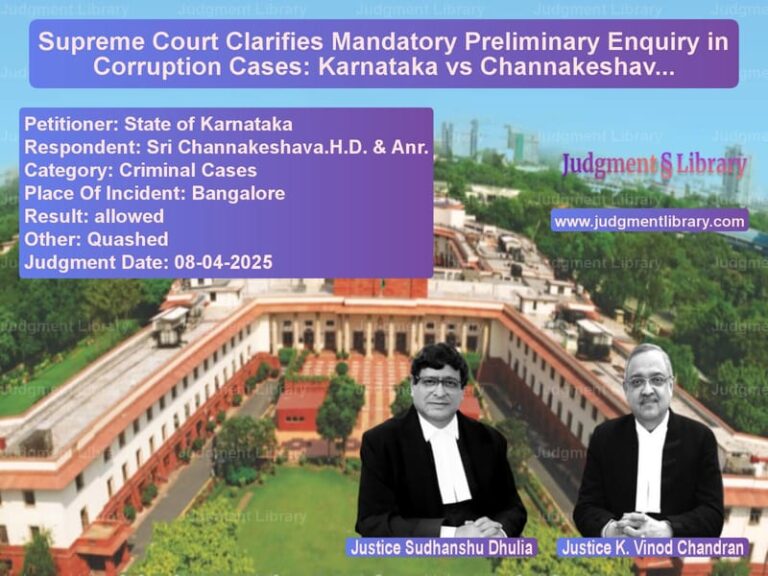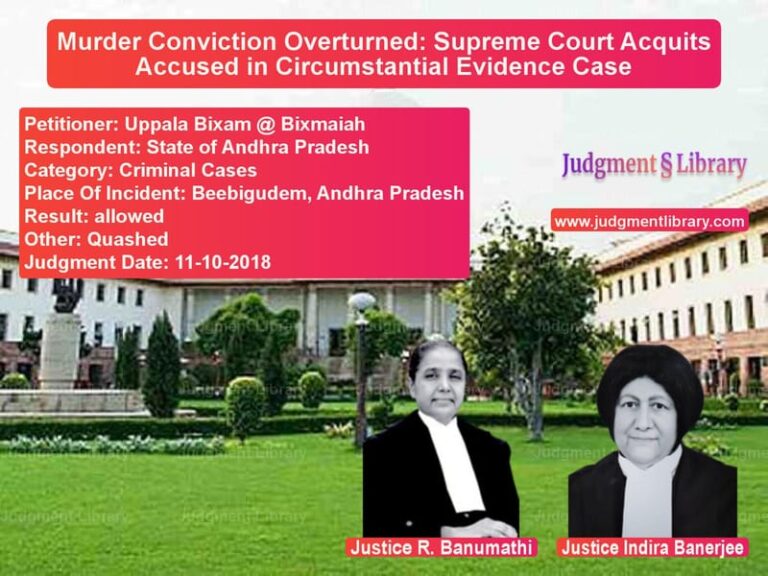Income Tax Disallowance Under Section 40(a)(ia): Supreme Court’s Interpretation
The case of M/S. Palam Gas Service vs. Commissioner of Income Tax brings forth a crucial interpretation of Section 40(a)(ia) of the Income Tax Act, 1961. The Supreme Court’s ruling clarifies the applicability of tax deduction at source (TDS) provisions for payments made to contractors and sub-contractors and its impact on income tax deductions.
Background of the Case
The appellant, M/S. Palam Gas Service, was engaged in the business of selling LPG cylinders. During an income tax assessment for the financial year 2006-07, the tax authorities found that the company had made payments to three sub-contractors for transportation services. However, tax was not deducted at source (TDS) on these payments.
The Assessing Officer invoked Section 40(a)(ia) of the Income Tax Act and disallowed the deduction of the said expenditure. The appellant challenged this decision through successive appeals, which were dismissed by the Commissioner of Income Tax (Appeals), the Income Tax Appellate Tribunal (ITAT), and the High Court of Himachal Pradesh. Finally, the case reached the Supreme Court.
Legal Provisions Involved
Section 40(a)(ia) of the Income Tax Act
This section disallows certain expenditures as deductions if TDS is not deducted or paid on time. It states:
“Any interest, commission or brokerage, fees for professional services or fees for technical services payable to a resident, or amounts payable to a contractor or sub-contractor, being a resident, for carrying out any work (including supply of labor for carrying out any work), on which tax is deductible at source under Chapter XVII-B and such tax has not been deducted or, after deduction, has not been paid during the previous year.”
Section 194C – TDS on Contractor Payments
Under Section 194C, any person responsible for making payments to contractors or sub-contractors must deduct TDS either at the time of credit or payment, whichever is earlier.
Rule 30(2) of the Income Tax Rules
This rule specifies the time limit for depositing TDS with the government:
- For payments made in March: TDS must be deposited by April 30.
- For other months: TDS must be deposited within seven days from the end of the month.
Key Legal Question
The main issue in this case was:
“Does Section 40(a)(ia) apply only to amounts ‘payable’ at the end of the financial year, or does it also cover amounts already paid to contractors without TDS deduction?”
Arguments Presented
Appellant’s (M/S. Palam Gas Service) Arguments
- Section 40(a)(ia) only applies to amounts still ‘payable’ at the end of the year, not amounts that have already been paid.
- The word ‘payable’ in the section should be interpreted strictly, meaning expenses already paid should not be disallowed.
- They relied on the Allahabad High Court judgment in CIT v. Vector Shipping Services (P) Ltd., which held that only outstanding payments attract disallowance under this section.
Respondent’s (Income Tax Department) Arguments
- The purpose of Section 40(a)(ia) is to ensure tax compliance by making TDS deduction mandatory.
- Not deducting TDS, whether on payments made or outstanding dues, violates tax laws and should lead to disallowance of the expenditure.
- Several High Courts, including the Madras, Calcutta, and Punjab & Haryana High Courts, had ruled that the section applies to both paid and payable amounts.
Supreme Court’s Ruling
The Supreme Court ruled against the appellant, holding that:
- Section 40(a)(ia) applies to both ‘payable’ and ‘paid’ amounts.
- The objective of this section is to enforce TDS compliance.
- The judgment of the Allahabad High Court in Vector Shipping Services was incorrect and overruled.
- The appellant’s payments to sub-contractors without TDS deduction violated tax laws, and the expenses were rightly disallowed.
The Court stated:
“Once it is found that the aforesaid Sections mandate a person to deduct tax at source not only on the amounts payable but also when the sums are actually paid to the contractor, any person who does not adhere to this statutory obligation has to suffer the consequences.”
Impact of the Judgment
The Supreme Court’s ruling has significant implications for businesses and taxpayers:
- All payments to contractors and sub-contractors must comply with TDS provisions, whether pending or already paid.
- Failure to deduct and deposit TDS on time will lead to disallowance of the expenditure.
- Taxpayers must maintain strict compliance with Section 194C and Rule 30(2) to avoid penalties and disallowances.
- The ruling resolves conflicting High Court judgments, providing clarity on the interpretation of Section 40(a)(ia).
Conclusion
The Supreme Court’s decision in M/S. Palam Gas Service vs. Commissioner of Income Tax is a landmark ruling that strengthens TDS compliance measures. Businesses must ensure that all contractor payments are subjected to TDS deductions as per the law, failing which such expenses will be disallowed in tax assessments. This judgment upholds the broader objective of the Income Tax Act in ensuring tax compliance and preventing revenue loss.
Don’t miss out on the full details! Download the complete judgment in PDF format below and gain valuable insights instantly!
Download Judgment: MS. Palam Gas Servi vs Commissioner of Inco Supreme Court of India Judgment Dated 03-05-2017.pdf
Direct Downlaod Judgment: Direct downlaod this Judgment
See all petitions in Income Tax Disputes
See all petitions in Tax Evasion Cases
See all petitions in Banking Regulations
See all petitions in Judgment by A.K. Sikri
See all petitions in Judgment by Ashok Bhushan
See all petitions in dismissed
See all petitions in supreme court of India judgments May 2017
See all petitions in 2017 judgments
See all posts in Taxation and Financial Cases Category
See all allowed petitions in Taxation and Financial Cases Category
See all Dismissed petitions in Taxation and Financial Cases Category
See all partially allowed petitions in Taxation and Financial Cases Category

